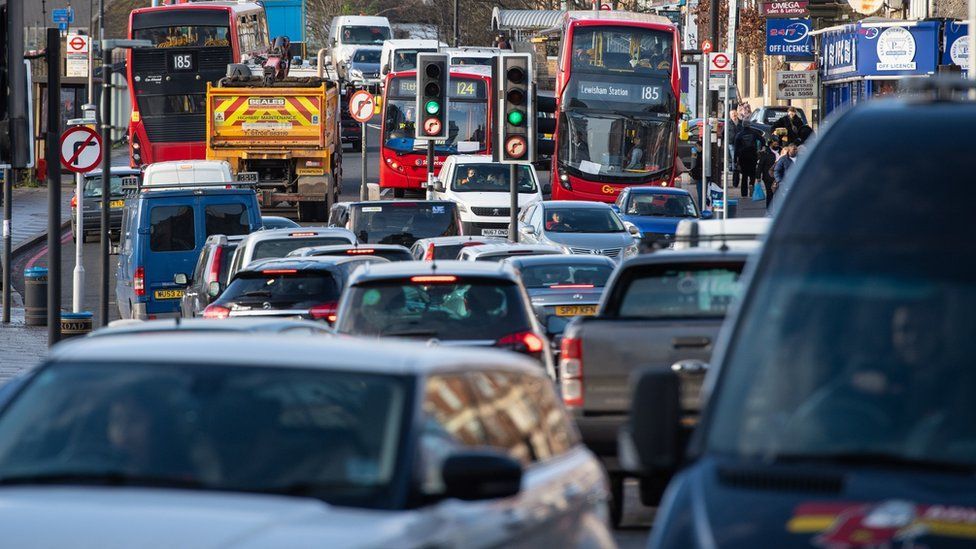Net Zero and immigration: the strangulation of Britain
News & Social Media / Post
Mass immigration and Net Zero is choking Britain to death

I am generally opposed to the war on motorists and the way in which greedy councils persecute drivers, often to their own detriment, is something that needs reining in. But the flip side of that is that divers are also lazy and selfish sods who behave appallingly. There is also an inherent good in reducing the use of cars and dissuading people from making unnecessary car journeys. There are too many cars on our roads and too many parked cars clogging our streets.
In that, there are some lessons to be learned from Covid lockdowns. A great many of us have a largely pointless commute for the sake of presenteeism. We have turned a corner on home working, and I think this is one of the good things to come of Covid. Moreover, with energy and fuel costs rising, businesses will be looking to keep their overheads low, and home working is one way to do that.
There is also the question of congestion, which is a thief of our time, space and energy. We’re constantly having to expand road capacity at enormous cost so more of us can embark upon miserable daily commutes. Why in god’s name do we wish to perpetuate this depressing existence?
The main reason we’re so hooked on our cars is because outside of London, public transport sucks. It’s expensive and time consuming, and it’s unreliable. The only thing worse than sitting in a traffic jam in the cold, dark winter months is standing at a bus stop in the freezing rain for a bus that may not even show up, using up two hours for a trip that shouldn’t even take one. Then, when a bus does show up, it’s usually crowded, damp, dirty and with insufficient leg room.
Commuter trains aren’t much better either. If you miss one you can have anywhere up to an hour’s wait for the next one and getting a seat is not guaranteed. Life is too short for that kind of drudgery. Commuting is grim. It chokes our towns and cities, it makes us fat and unhealthy and influences poor diets. We should, where possible, be looking to put commuting in Room 101.
The war on on motorists, though, has failed time and again. My home town made itself a hostile environment for cars and removed virtually all of the convenient parking, which then saw an out of town retail park pop up which pretty much killed the town centre. Greenie liberal councils have adopted similarly hostile policies, which have only succeeded in diverting the traffic to other places. I’ve lived in York for two years now and I can count on one hand the number of times I’ve been into Town. There is a pretty decent park and ride system, but it rules out any notion of popping in and out. It’s costly in time.
Ultimately, to get people out of their cars, you need to offer a cost effective and time effective alternative – but all we get is stick and no carrot. Drivers then simply absorb the punishment and living standards suffer. In that regard, what we really need is real investment in local public transport. Instead of HS2, the money ought to be directed into local train services, and where possible, undoing the Beeching closures.
This is where there is a difference between environmentalists and global warmists. The former is a sincere care for the environment, while the latter is a deeply political agenda rooted in a desire to control and micro manage people – which is why there’s much commonality between warmists, Europhiles and lockdowners. The global warmist want to perpetuate the car because the vehicle-to-grid (V2G) concept is an essential crutch for Net Zero. Real environmentalists observe that an electric car, with all its polluting rare earth minerals, is still a car, and demands the same space and infrastructure as ICE vehicles.
Their answer to that is to get us all on bicycles, but what works for provincial towns in the orbit of London does not work elsewhere. Cycling in Bradford certainly wasn’t an option for a busy adult. There are these things unknown to southern planners called “hills”. I could cycle downhill to work in about twenty minutes. It would take an hour and a half to get back up the hill, only to arrive home an exhausted, sweaty mess, unable to do anything productive with the rest of my evening.
When it comes to the war on the motorist, we are told that the alternatives are cheaper, but it’s instructive that they place no premium on our time. Cycling takes longer than a car. Sitting by a charging point for an hour or more is not a sensible use of time. They have a vested interest in blocking fast chargers because fast charging goes against the purpose of electric cars – which is primarily to balance the grid and back up useless windmills. If then, the anti-car lobby wins out, there are insufficient electric vehicles around for the V2G system to work.
But then the great EV revolution isn’t going to happen anyway. Current geopolitical events have seen the price of rare earth minerals, metals and microchips soaring, while the 90’s era model of globalisation is quietly imploding. The assumption was that EVs were going to fall in price, and that we would see faster adoption. Presently the prospectus doesn;t look good. A half decent EV is set to cost considerably more and will be no cheaper to run. The government somehow has to recover the same levels of revenue it currently extracts from sales of petrol and diesel. In terms of cost and convenience, the EV revolution is a step backwards.
One partial solution is to admit that demand for road space is exceeding supply and institute demand side management. The green blob is a huge fan of demand side management when it comes to rationing electricity, so shouldn’t that also inform our immigration policy? There are more people than our infrastructure can sustain, and the influx outpaces any new infrastructure. The only war the London tube can manage demand is to use price as a deterrent. Mass immigration is making life more expensive and less convenient.
It should also be noted that it’s only by way of luck that this winter we did not see rolling blackouts across the national grid. Our disastrous focus on renewable energy has left the nation’s electricity supply dangerously vulnerable. New generation is falling behind the rate of decommissioning of conventional plant. This, though, doesn’t stop Net Zero cultists calling for the electrification of home heating and EVs. They may be able to use EVs for grid balancing but they still need to be charged with something. If we’re going to throttle new gas exploration then we urgently need to reduce the influx of immigrant settlers. That shouldn’t be logistically difficult for any government. There are well over a million illegals in the UK, and the Home Office knows where to find them.
More to the point, it is difficult to see how the economy can sustain the same level of unskilled and semi-skilled labour. The senseless commute we subjected ourselves to provided all manner of job opportunities for migrants working in coffee shops and fast food venues, among other commuter services, but if we’re doing away with it, and at a time when ordinarily disposable income is going on heating bills, we could soon have too many migrants chasing too few jobs, leading to an explosion in organised crime and inter-ethnic rivalry on our streets.
Any way you look at it, the government is dithering on every major area of policy, attempting to ride two horses. It wants us to switch to EVs while punishing motorists. It wants us to use less energy while importing more people. It wants to build more windmills knowing that only coal and gas can plug the gaps when the wind doesn’t blow for weeks on end. Battery storage isn’t going to cut it. You can either run the economy in the best interests of the people or you can have Net Zero. You can have a coherent, functioning society or you can have open borders. You can’t have both. It’s time for the Tories to decide.
Recent National News











